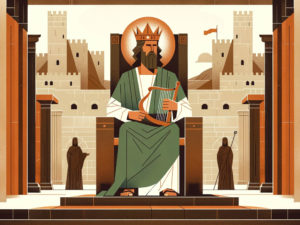Full book summary of “God Knows” novel by Joseph Heller, the author famous for “Catch-22“. Heller published “God Knows” in 1984, and it presents a satirical retelling of the Biblical story of King David. The novel takes the form of a memoir by David, looking back on his life with a modern sensibility and the benefit of hindsight. The book is known for its irreverent and humorous take on the well-known biblical events and for exploring themes of love, religion, and mortality with Heller’s characteristic wit.
Short Summary
 An elderly King David recounts his life story with irreverence and wit. He starts as a shepherd and rises to become the King of Israel, facing giants, enemies, and personal failings. His narrative is peppered with anachronistic humor and modern commentary, challenging the traditional image of a biblical hero as he discusses his complex relationships and struggles with faith.
An elderly King David recounts his life story with irreverence and wit. He starts as a shepherd and rises to become the King of Israel, facing giants, enemies, and personal failings. His narrative is peppered with anachronistic humor and modern commentary, challenging the traditional image of a biblical hero as he discusses his complex relationships and struggles with faith.
Full Book Summary Chapter-by-Chapter
1. Abishag the Shunammite
David’s twilight years are warmed by the presence of Abishag, a beautiful young woman from Shunem. Despite her role to comfort the aging king, David’s thoughts often turn to his past, particularly his relationships with his wives and the political implications of his marriages. Abishag’s youth and vitality starkly contrast with David’s frailty, and her virginal status becomes a symbol of the king’s waning power. Yet, she is more than a mere attendant; she is a confidante and a silent witness to the king’s reflections on his life, legacy, and the looming succession crisis.
2. Of the Making of Books
David contemplates the endless cycle of storytelling and the written word, pondering the impact of his own story. He considers the irony of his fame, which began with the slaying of Goliath—a deed that catapulted him into a life of unceasing conflict and responsibility. The chapter serves as a meditation on the burdens of leadership and the consequences of one’s actions, with David’s victories and follies immortalized in scripture and song. The permanence of his tale is a source of both pride and regret, as it will influence generations long after his death.
3. On the Day of my Killing of Goliath
The chapter revisits the defining moment of David’s youth: the slaying of the Philistine giant Goliath. This act of valor and faith marks the beginning of David’s ascent to power but also sets in motion a series of events that will shape his entire life. The victory brings him royal favor and military command, yet it also sows the seeds of King Saul’s jealousy and paranoia. David’s reflection on this day is tinged with an understanding of its cost—while it was a triumph, it also bound him to a path of endless strife and personal sacrifice.
4. The Days of My Youth
David reminisces about his early life, the simplicity of his days as a shepherd, and the unexpected turn of events that led him to the court of King Saul. His reflections reveal a mix of nostalgia and the wisdom of hindsight, recognizing the seeds of his future trials in these formative experiences. The innocence of his youth stands in stark contrast to the complexities he faces as a king, highlighting the transformative journey from the pastures to the palace.
5. Arms and the Man
This chapter delves into David’s prowess as a warrior and his rise to prominence within Saul’s army. His skill in battle and his strategic acumen earn him both respect and envy, setting the stage for future conflicts. David’s martial abilities are not just physical but also psychological, as he understands the importance of morale and leadership in warfare. His reflections on the nature of combat and power provide a deeper understanding of the man who would come to be known as one of Israel’s greatest kings.
6. In the Service of Saul
David’s service under King Saul is marked by loyalty and success, but also by the growing tension between them. Saul’s mental state deteriorates, and David’s presence as a musician and a soldier becomes both a comfort and a threat to the king. The dynamics of their relationship are complex, with David navigating the delicate balance between serving his king and protecting his own life from Saul’s increasing paranoia and jealousy. The chapter captures the irony of David’s situation: his talents and victories, which should secure his place in Saul’s favor, instead sow the seeds of his downfall.
7. Flight into Gath
David, now a fugitive, seeks refuge in the Philistine city of Gath. His escape to the land of his enemies underscores the desperation of his situation. In Gath, he must conceal his identity and past victories against the Philistines to survive. This chapter captures the irony of David’s plight: the slayer of Goliath now hiding among Goliath’s people, a stark testament to the complexities of his relationship with Saul and the political landscape of the time.
8. In the Cave of Adullam
The cave of Adullam becomes a sanctuary for David, a place of gathering for those who are distressed, indebted, or discontented. Here, David assumes the role of a leader among outcasts, shaping the future core of his loyal followers. The cave serves as a crucible for David’s leadership, where his ability to inspire and command men in dire circumstances is honed. This period is a formative one, as David transitions from a solitary fugitive to the head of a formidable band.
9. Seven Years I Suffered, Seven Years
David endures seven long years of hardship, a time marked by constant danger, political maneuvering, and personal growth. These years of suffering are also years of maturation, where David’s faith, character, and leadership are tested and refined. The chapter reflects on the duality of this period: the pain of the trials he faces and the strength he gains from overcoming them. David’s resilience during these tumultuous times lays the foundation for his eventual rise to the throne.
10. Naked We Were
This chapter delves into David’s musings on the simplicity of earlier times, contrasting with the present complexities. He reminisces about the days of Samson, reflecting on his brute strength and the tumultuous relationship with the Philistines. David criticizes Samson’s lack of wisdom and foresight, drawing a parallel to his own more strategic and thoughtful approach to leadership. The narrative also touches on the themes of storytelling and the embellishment of tales, as David acknowledges the poetic license taken in the recounting of history, including his own.
11. So It Came to Pass
David reflects on the nature of storytelling and the embellishment that often accompanies the retelling of historical events. He discusses the poetic nature of his own writings, such as the elegy for Saul and Jonathan, and the way in which these works prioritize beauty and emotional truth over factual accuracy. The chapter serves as a meditation on the role of the artist and the intersection of art, history, and personal expression.
12. Snake in the Grass
David addresses the themes of envy and betrayal, which have been recurrent in his life. He recounts the events leading up to his iconic battle with Goliath, providing insight into his mindset and the familial tensions that existed even before his rise to fame. The title “Snake in the Grass” suggests the presence of hidden enemies or treachery, which could refer to the duplicitous nature of court politics that David had to navigate throughout his reign, or perhaps the betrayal by those he considered close to him.
13. In the Cave of Machpelah
David, in the Cave of Machpelah, reflects on the legacies of his predecessors and the transient nature of power. He contemplates the efforts of Joseph and Moses, their contributions to the nation, and the fleeting gratitude of the people. David sees the cave as a symbol of his own mortality and the impermanence of his achievements. He laments the ingratitude and short memories of the people, who quickly forget the sacrifices made on their behalf.
14. Kings
In “Kings,” David discusses the burdens of leadership and the folly of his successors, particularly Solomon and Rehoboam. He criticizes Solomon’s excessive expenditures and Rehoboam’s arrogance, which led to the division of the kingdom. David contrasts their actions with his own reign, emphasizing the hard work and suffering he endured to unite and rule Israel. He expresses a sense of betrayal by God, feeling that despite fulfilling his part in God’s plan, the divine support he once felt was fleeting.
Interesting Facts About “God Knows”
Innovative Narrative Style
Heller’s use of a first-person narrative allows King David to speak with a modern voice, blending contemporary slang and anachronisms with ancient events.
Irreverent Take on a Sacred Story
The novel stands out for its irreverent humor, as Heller turns a revered biblical tale into a vehicle for satire and social commentary.
Intertextual References
“God Knows” is rich with references to modern culture, history, and literature, creating a tapestry that connects past to present.
Philosophical and Theological Exploration
Heller uses David’s character to explore deep questions about the human condition, the nature of God, and the complexities of faith.
Critique of Heroism
The novel challenges traditional notions of heroism, presenting David as deeply flawed and relatable, rather than the idealized figure often depicted in religious texts.
Heller’s Personal Connection
The themes of aging and reflecting on one’s life in “God Knows” may reflect Heller’s own stage in life when writing the book, offering a more personal glimpse into the author’s thoughts and feelings.
Reception and Legacy
While not as universally acclaimed as “Catch-22,” “God Knows” has its own dedicated following and is considered a thought-provoking and entertaining read by fans and critics alike.
FAQ
How does “God Knows” compare to “Catch-22”?
While “Catch-22” is a satirical war novel that critiques bureaucracy and the absurdity of war, “God Knows” is a biblical satire that examines religious themes and the human condition. Both showcase Heller’s sharp wit and critical eye, but they tackle very different subjects.
What genre does “God Knows” belong to?
“God Knows” is a satirical novel that blends historical fiction with contemporary satire. It reimagines the biblical narrative of King David with modern sensibilities and humor.
Is “God Knows” a religious book?
While “God Knows” is based on a religious figure and biblical events, it is not a religious book in the traditional sense. It is a satirical and fictional account that explores religious themes through a critical and humorous lens.
What are the central themes of “God Knows”?
The central themes include the complexity of human relationships, the nature of divine justice, the questioning of faith, and the struggles of leadership. It also delves into the humanizing aspects of historical and religious figures.
How historically accurate is “God Knows”?
“God Knows” is not intended to be a historically accurate account. It is a fictional reimagining that takes liberties with the timeline and events for the purpose of satire and commentary.
Why does Joseph Heller use anachronisms in “God Knows”?
Heller uses anachronisms to draw parallels between the ancient past and the modern world, highlighting the timeless nature of certain human experiences and concerns.
🗣️ Comment now and join the debate! Is “God Knows” a masterpiece or mere mockery? The scroll is in your court! 📜👇

Comments